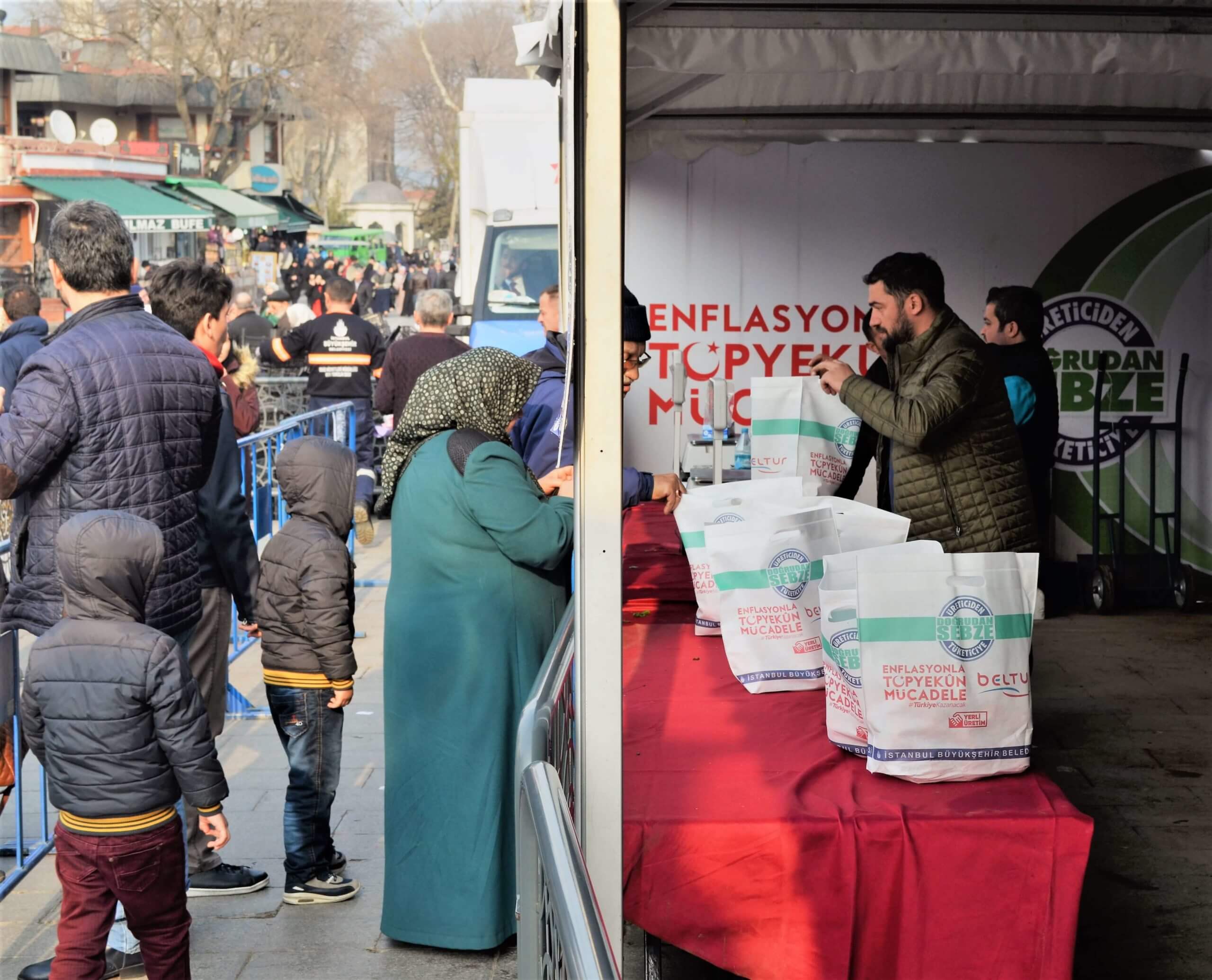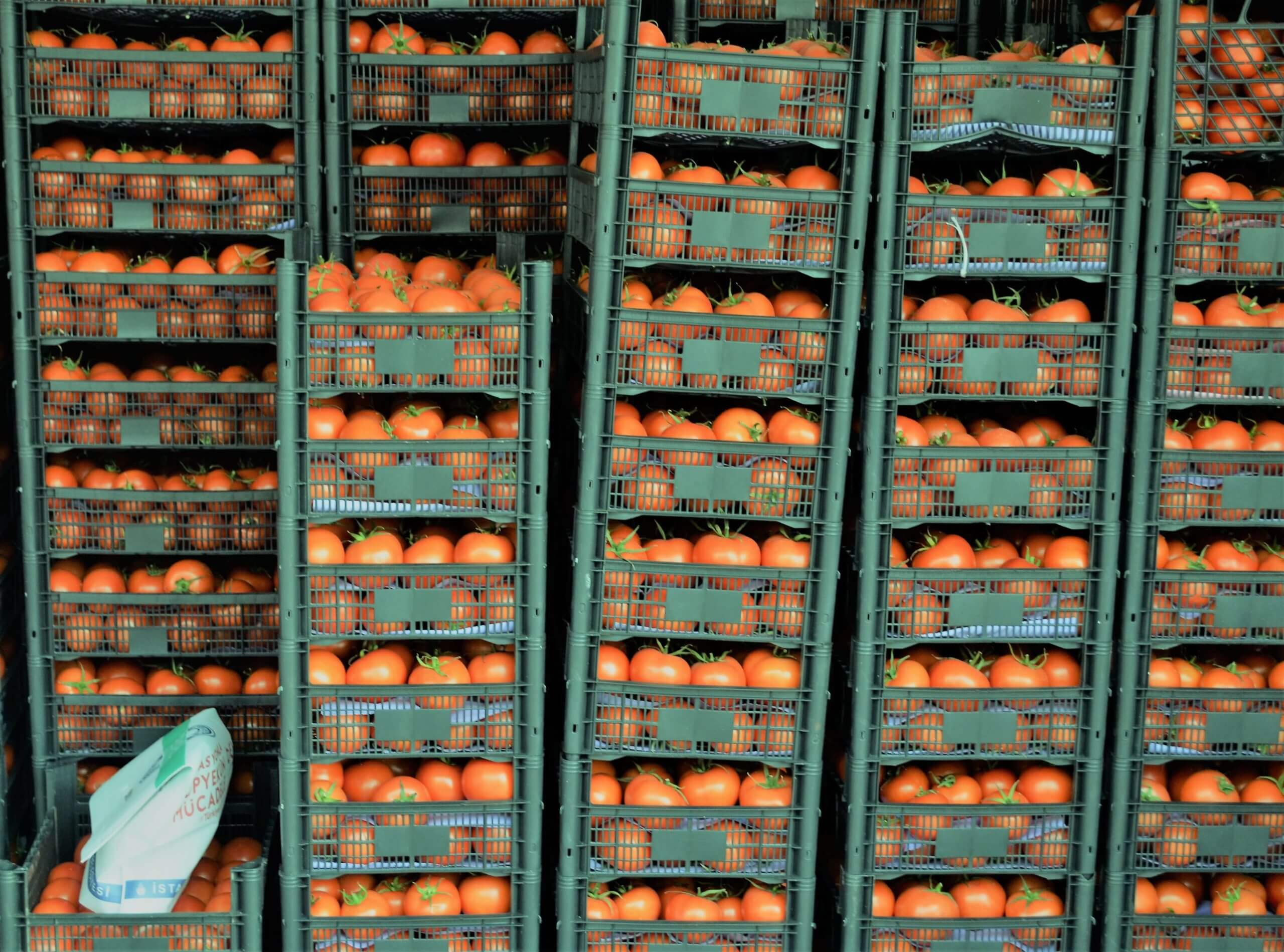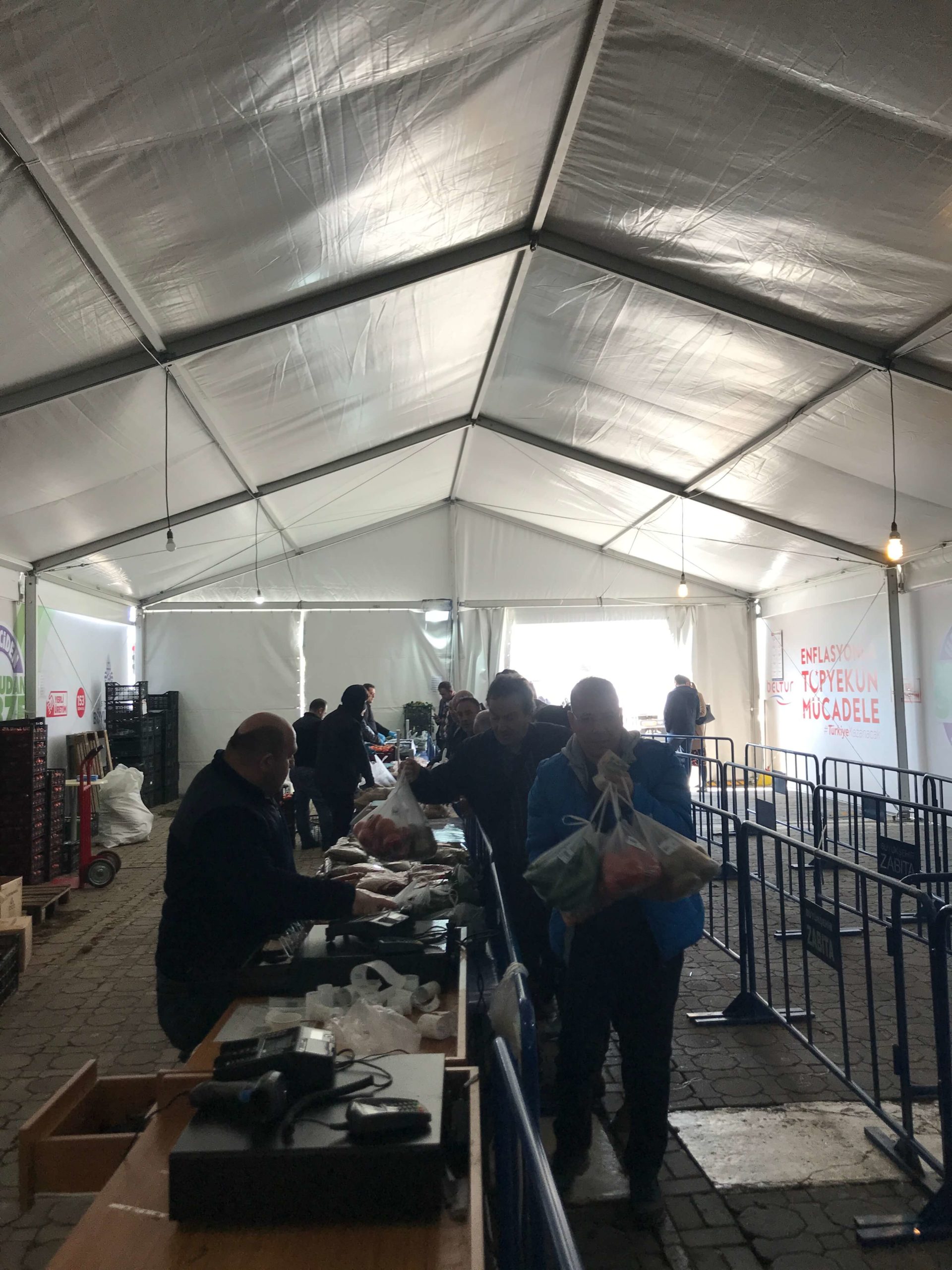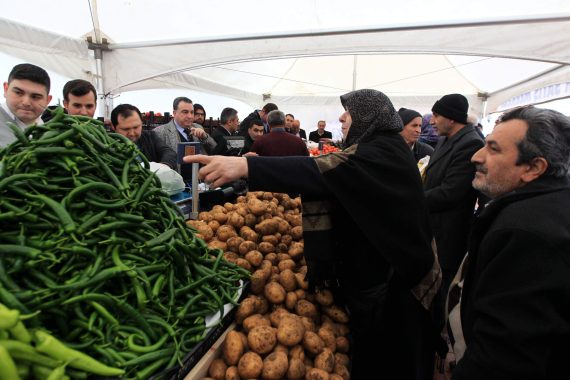The regulation markets, also known as ‘Tanzim’ markets, which were introduced in Turkey recently have been subject to intensive debate. Some have argued that the regulations were simply a temporary protection policy for the benefit of citizens who have been affected by the increase in vegetable prices, while others claim that regulation markets are beneficial to low-income citizens and that there is nothing wrong about it. The New Turkey interviewed people visiting the markets in two different locations in Istanbul – Eyup and Kadikoy squares – in order to see what ordinary people think about the newly introduced system.
Eyup Square
First, we visited Eyup square, during a weekday afternoon. The market is a small stand where you can enter by following the designated barriers in order to follow a queue. It is exactly the same way in which stands in street festivals or Christmas markets are located in Europe. There are police officers of the municipality, which are called ‘Zabita,’ that wait around the stand, and of course attendants who are responsible for selling the products inside the stand.
During our visit around 3pm, there were not many customers in the market at Eyup square, and there was only one product left: Tomatoes. In fact, some customers were complaining that there was nothing left but tomatoes. Officers working at the stands told customers that they had everything in the morning: spinach, eggplant, cucumber, potatoes, and more. However, they were all sold during the first half of the day. Officers also added that the queues for the markets begin early hours in the day.
An interesting observation from our visit was the hesitation and timidity of both the officers and the majority of customers speaking to The New Turkey about their opinions on the market. Many people, including officers, asked for which TV channel or newspaper we were asking questions for and when we told them it was for an English-medium website, they were even more confused! However, the majority of customers gave their sincerest opinions about the markets regardless of what other people think; still, they did not feel comfortable in being photographed or mentioned with their full names and occupations in the interviews.
 Customers at the regulation market in Eyup.
Customers at the regulation market in Eyup.
Ahmet, in his 30s, said that he heard about the market on TV and that this was his first time buying products from the market. He claimed that the prices were cheaper than both supermarkets and street markets. However, he did not think that the introduction of this system would decrease the prices in general. He confirmed that he would definitely visit the market again for shopping, but stated that he was not sure whether this system could be a permanent one.
A couple in their late 30s – Samet and Gulay – also said that it was their first time shopping at the market. They told us that they heard about it on TV and that they’d visit it since they lived nearby. They also thought that prices were lower than the supermarkets and street markets. Samet argued that if the regulation markets continue, they could save some money on grocery shopping. They both thought that prices in regular markets were not affected by the introduction of these markets, but added that if this system continues, it may then have a positive impact on the currently high prices.
Another couple in their early 50s – Mahmud and Aysegul – stated that this was their first visit to the market, Mahmud adding that he know the location in Eyup since its introduction. They both thought that the prices were ‘fine’ but complained about the fact that there were not many products. “We won’t really see the impact on our budget by just buying tomatoes.” They also did not think that the introduction of the system has lowered the prices in regular markets. When asked whether they thought these markets would be permanent, they smiled and commented, “We will see.”
Two friends in their mid-50s – Hayriye and Filiz – said that they visited the market a couple of times before, since they were living in Eyup. Like the previous couple, they also complained about the limited products sold in these markets, adding that they came to buy onions and potatoes but that they were only able to buy tomatoes. Filiz said that the limited variety of products were rapidly finished during the early hours of the day. They said that we had to wait and see if this system would be a permanent solution to the high prices.
Two women and close friends – Sevvim and Havva in their mid-40s – responded to our question, “First time shopping here?” with a huge smile on their faces. “Well, we could not buy anything!” They said that they heard about the market on TV but that they did not know the location. When they were passing by the square they wanted to buy some vegetables but could not find anything else but tomatoes. They told us that they lived in Talatpasa, Okmeydani, and that they would shop in these regulation markets if they were also opened in their areas. The stand attendant informed them that there is a regulation market in Okmeydani, operating 7 days a week (like all regulation markets) between 10am and 7pm, which both of them were not aware of. Sevvim and Havva believed that the prices were ‘fine’ after reading them on the signs, but they stressed that the prices in regular markets were not affected by the prices at all.
 Picture of the tomatoes sold at the regulation market in Eyup.
Picture of the tomatoes sold at the regulation market in Eyup.
Meral, in her early 40s, said that she was from Umraniye and that there is always a queue at the market there. She added that when she saw that there was no queue at the Eyup market, she thought she could stop by and load some vegetables to her car. She commented on the prices as ‘fine,’ and added that “I prefer to buy my groceries first from these markets – of course, if I can find what I am looking for without waiting in a queue.” She also added that although she’d only save a little amount by shopping at the regulation market, “But we need to save these small amounts, everything is getting expensive nowadays, so every dime is worth saving.” She also said that she was not sure as to whether the new system had an impact on decreasing the regular prices.
Ramazan – in his mid-60s – was a regular customer. “I live here and so I often pass by and shop.” He stated that prices were lower than those at the markets, and added that this had a positive impact on his expenses. “I guess the prices in the markets are not affected and in street markets they are changing from week-to-week, I do not know why!” He simply responded by saying “Inshallah” (God willing), to the question as to whether this system would be a permanent solution to high prices.
Hilmi – in his late 40s – said that he heard about the market first on various media channels. “Everybody is talking about these markets.” He stated that the prices were “amazingly cheaper” than even the street markets. He also underlined that prices in regular markets had not changed radically after the introduction of this system.
Recommended
Hasan – in his late 70s – said that he often visited the square to pray in Eyup mosque, coming from Florya, where he has not yet seen a regulation market. He bought 4kg of tomatoes and argued that the price in Florya was 8 Lira per kg, whereas it was 3 Lira less per kg at the regulation markets. He also thought that shopping here would definitely have a positive impact on his household expenses. “It is a huge difference in one kg, of course it has a positive impact. I save almost 5 lira per 1kg of tomatoes, it is amazing.” He wished that the system would be permanent by saying, “The prices are so high. I am at this age, and I have never seen such prices like 7-8 Liras for tomatoes, and 4-5 Liras for onions. May God help the poor.”
Senol – in his mid-40s – said that he had been aware of the market since its introduction. “Everyone is talking about it, how can I have not heard about it?” He believed the prices were very good. “I’m happy about the introduction of these markets. Those people who play with the prices should be ashamed.” He thought shopping at these regulation markets would have a positive impact on his budget. “The price I pay for the same tomatoes per kg. in a market is more than double the price of what I pay here. The profits made by markets are more than 100% for some products. What is this? Is it fair?” In response to whether regulation markets could only constitute a temporary solution and whether they would be permanent, he said: “Well, if they [supermarkets and traders in the food chain] do not lower their huge profit margins, the state has to introduce this system. May God do as He wishes to those [traders in the food chain] who are not satisfied with the profit margin they make.”
Kadikoy Square
Our second visit was to Kadikoy square during the morning. The market tent was much bigger than the one in Eyup, but was set up in the same way. There was a small queue and more products – including newly introduced legumes. Like Eyup, people were hesitant in responding to our questions, whether they were in a rush or simply because they did not want this topic to be discussed from an ‘ideological’ perspective but rather assessed on its practicality. Still, there were people who responded sincerely to our questions, reflecting their views without hesitation.
Recep – in his mid-30s – was the first to speak to us and who told us that he shopped from the market more than once on his way to his home in Maltepe. He added that there was also a market in Maltepe and depending on his commute, he either visited the market in Maltepe or Kadikoy. Like a majority of the interviewees, he confirmed that the prices at the regulation markets are better compared to both supermarkets and street markets. Being positive about the system, he said that small amounts of savings were important for a family and believed that the prices in markets had begun to decrease, but that they had to fall down more in order to reach ‘normal’ levels. Recep did not think that this system had been introduced just for the election period and said that they would continue to operate after the elections. When asked about the queues in the morning hours, he said that he did not notice such an abnormal crowd in either Maltepe or Kadikoy.
Hakan – in his early 40s – said that he had shopped more than once at the regulation markets on his way home to Uskudar. He also confirmed that the prices were “fine” compared to street markets and supermarkets, and that he could notice a positive impact on his budget even though the impact was small. He also commented that the prices in street markets had been influenced by the introduction of these regulation markets and had decreased relatively compared to the prices before. He argued that if the prices in supermarkets and street markets would be regulated effectively against any unfair increase, then there would be no more need for the regulation markets, but that if the unfair prices continue to increase, then the system should be permanent.
 Customers shopping at the regulation market in Kadikoy.
Customers shopping at the regulation market in Kadikoy.
Kemal – in his mid-60s – stated that it was his first time at the regulation market and that the prices were just “fine.” He stated that he did not visit the street markets anymore so he couldn’t compare prices, but that compared to supermarkets, he thought prices at the regulation markets were lower. He did not think that the introduction of regulation markets would affect the prices at supermarkets and when asked on whether or not shopping at the regulation market had a positive impact on his budget, he responded, “Well, I spend according to my budget. I do not buy more than what is necessary.”
Ramazan – in his late 40s – also said that it wasn’t his first time visiting the regulation market and that the prices were slightly lower than street market prices. He did not believe that this system would cause a decrease on the prices in regular markets and that the system would not be a permanent one. “These markets would only continue for another week or two.”
Adnan – in his early 50s – was visiting Istanbul from Tokat. While he said that it was his first time at the regulation market, he would continue to shop from these markets if prices remained low. He also commented that in the long-run, if regulation markets continue to operate, this new system would decrease the prices at regular markets. He also said that he did not see any of these markets in his hometown Tokat.
Yildiz – in her early 50s – said that it was her first time shopping here and that she saw it on her way passing by the square. A native of Kadikoy, she said that the prices were “fine” compared to supermarkets, but that she could only find limited kinds of products. She argued that the low prices in regulation markets would have an impact on the street markets. “I will visit these markets from now on, I do not plan to go to street markets for vegetables as long as I can buy them here, but they do not have everything.” She also wished that these markets would be permanent by saying, “God willing, they continue to operate after the elections.”
Ozkan – in his mid-40s – criticized the system, as he was not shopping but waiting for a friend who was buying some products from the market. He said, “They buy these vegetables from farmers like the regular actors in this business, then they bring it here with the same expenses of the traders – gas, transportation, workers, etc. The cost is the same, but they sell it here without any profit! Governments should not be involved in this kind of process.”
Mehmet – in his early 70s – said that this was his first time shopping at the regulation market and that the prices were lower here than the street markets. He stated that he could not notice whether shopping here had a positive impact on his budget *smiles* but hoped that the system would continue after the elections. He also believes that if the system continues to operate, it would certainly decrease the excessive prices in regular markets. “The street market is very close to where I live, but I didn’t go this week, I came here. All these people who are shopping here used to buy groceries from street markets. Now, they shop here. Will this have an influence?”
Hilmi – in his mid-40s – said the prices were very good. “The prices are almost half of the regular prices and I certainly feel the impact on my budget as I spend less on my daily grocery expenses.” However, he did not believe that the regulation markets would decrease the prices in the long-run. “There are other, untold or unknown stories within the process,” which he did not want to explain in detail. He commented that the prices at the street markets were not affected by the regulation markets at all.
Our visit to two different regulation markets reflect the voice of the regular people who visit these newly introduced markets, from a very personal-micro level. In general, it can be stated that people are happy to shop at these markets, especially as the prices are cheaper than other markets across Turkey. Although there has been heated debates on these markets in the media from an ‘ideological/political’ perspective, people seem to evaluate them from a practical perspective of their daily routine, with few exceptions. Whatever politicians or experts say about these markets, people are judging them according to the practical results they serve.





